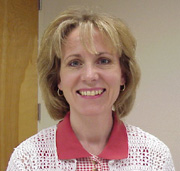 Going to college while working a full-time job is challenge enough, says Nancy Fahrenwald. But, living in South Dakota didn’t give the UNMC College of Nursing doctoral student many choices for doctoral nursing programs.
Going to college while working a full-time job is challenge enough, says Nancy Fahrenwald. But, living in South Dakota didn’t give the UNMC College of Nursing doctoral student many choices for doctoral nursing programs.
The answer: UNMC’s distance education program, which provided Fahrenwald the degree she wanted and the flexibility she needed.
An assistant professor of the College of Nursing at South Dakota State University, Fahrenwald recently defended her dissertation and will use the knowledge gained to benefit women enrolled in the Women, Infant and Children program. She will earn her degree this month.
Serving low-income families, mothers
Her interest in understanding the needs of low-income families and mothers began in 1989 while working as a community health nurse at the South Dakota Department of Health. It gave her the insight, background and desire to help such population.
Fahrenwald believes low-income single mothers have unique barriers — time, lack of childcare, child demands and fatigue — making physical activity inappropriate or inconvenient for them. Even so, the women viewed physical activity as a way to relieve stress, lose weight after pregnancy, and get some time alone or bond with their children.
Studying the benefits of moderate exercise
Fahrenwald wanted to know if educating women on the benefits of moderate physical exercise would motivate them. The 10-week study looked at 52 women from northern Midwestern states. Most women preferred daily 30-minute brisk walks, while others found exercise videos beneficial.
“WIC mothers are at risk for sedentary living and have not been previously reached for physical activity change,” Fahrenwald said. Her interest in disease prevention originally led her to focus on preventative physical health behavior because it reduces the risk for heart disease, cancer, diabetes and other disease.
The Surgeon General’s 1996 Report on Physical Activity and Health, which recommends at least 30 minutes of moderate activity five times a week, found that well over half of all Americans are physically inactive and that one out of four is not active at all. The report found that more than 60 percent of U.S. women do not engage in the recommended amount of physical activity and more than 25 percent of U.S. women are not active at all.
“This type of intervention is in support of national groups’ recommendations to increase physical activity among low income people,” said Jan Atwood, Ph.D., a professor at the UNMC College of Nursing and Fahrenwald’s adviser. “Especially mothers who can then pass on the information to their children and prevent or forestall disease in them.”
Study findings
Fahrenwald found that with intervention, the physical activity levels rose among the WIC mothers to at least a moderate level of daily physical activity. The uncertainty of the study is whether the women will continue with the physical activity, she said.
“This research needs to be revisited at a later date to see if WIC mothers have continued moderate daily activity after the initial intervention period,” Fahrenwald said. “They are the strongest influence in their children’s lives.”